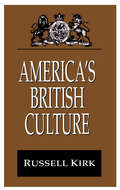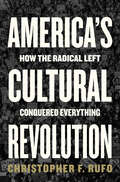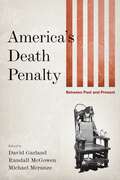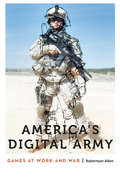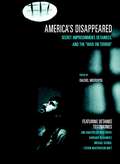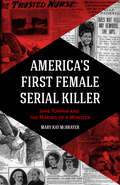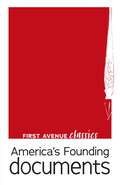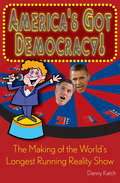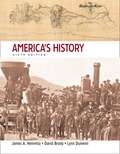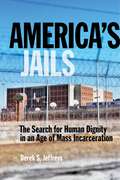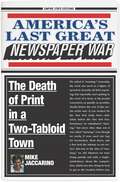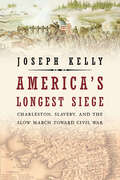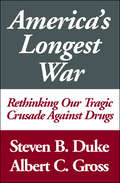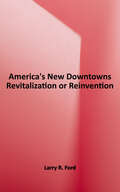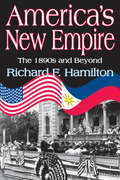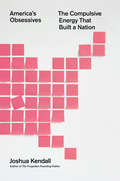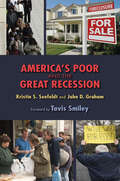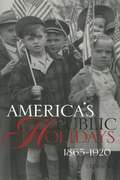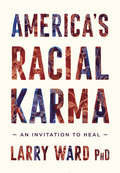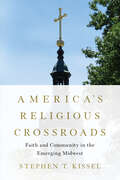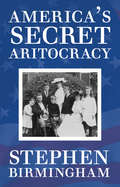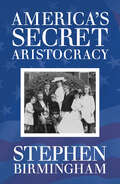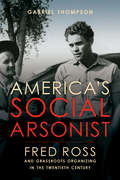- Table View
- List View
America's British Culture (The\library Of Conservative Thought Ser.)
by Russell KirkIt is an incontestable fact of history that the United States, although a multiethnic nation, derives its language, mores, political purposes, and institutions from Great Britain. The two nations share a common history, religious heritage, pattern of law and politics, and a body of great literature. Yet, America cannot be wholly confident that this heritage will endure forever. Declining standards in education and the strident claims of multiculturalists threaten to sever the vital Anglo-American link that ensures cultural order and continuity. In "America's British Culture", now in paperback, Russell Kirk offers a brilliant summary account and spirited defense of the culture that the people of the United States have inherited from Great Britain. Kirk discerns four essential areas of influence. The language and literature of England carried with it a tradition of liberty and order as well as certain assumptions about the human condition and ethical conduct. American common and positive law, being derived from English law, gives fuller protection to the individual than does the legal system of any other country. The American form of representative government is patterned on the English parliamentary system. Finally, there is the body of mores - moral habits, beliefs, conventions, customs - that compose an ethical heritage. Elegantly written and deeply learned, "America's British Culture" is an insightful inquiry into history and a plea for cultural renewal and continuity. Adam De Vore in "The Michigan Review" said of the book: "A compact but stimulating tract...a contribution to an over-due cultural renewal and reinvigoration...Kirk evinces an increasingly uncommon reverence for historical accuracy, academic integrity and the understanding of one's cultural heritage," and Merrie Cave in "The Salisbury Review" said of the author: "Russell Kirk has been one of the most important influences in the revival of American conservatism since the fifties. [Kirk] belongs to an
America's Cultural Revolution: How the Radical Left Conquered Everything
by Christopher F. RufoAN INSTANT NEW YORK TIMES, USA TODAY, AND AMAZON BESTSELLER America’s most effective conservative intellectual proves once and for all that Marxist radicals have taken over our nation's institutions.In the 1960s, Mao launched China’s Cultural Revolution. Cities grew overcrowded. Technocrats demanded progress from above. Anyone opposed was sent to be “re-educated.” China’s revolution was bloody, fast, and a failure, but what if America started a revolution at the same time, based on the same bad ideas, and it’s just been slower, calmer, and more effective?In his powerful new book, Christopher F. Rufo uncovers the hidden history of left-wing intellectuals and activists who systematically took control of America’s institutions to undermine them from within. America’s Cultural Revolution finally answers so many of the questions normal Americans have, such as:• Why is nearly every major corporation bending the knee to a far-left agenda?• How did DEI suddenly become the department no institution can continue without?• Why is race the main thing America’s rich, white elite wants to talk about? • When did the left adopt all this doublespeak, saying progress is a lack of progress, equality is not equality, speech is violence, and violence is speech?• Has the goal of the left, for a century, actually been the destruction of every Western institution? Readers may not know the names of Herbert Marcuse, Angela Davis, Paulo Freire, and Derrick Bell, but they will recognize the ideas they spread. How their radical, destructive ideology slowly worked its way from prisons to academia to classrooms to your human resources department will come as a shock.Failing to act soon, Rufo warns, could allow the radical left to achieve their ultimate objective: replacing constitutional equality with a race-based redistribution system overseen by bureaucratic ‘diversity and inclusion’ officials. Most Americans don’t want this, but most Americans are no longer in control of our institutions. If the mainstream media’s depiction of a failing dystopia in need of a fresh start never sounded right to you, this expose and call to arms is the book you’ve been looking for.
America's Death Penalty: Between Past and Present
by David Garland Michael Meranze Randall McGowenOver the past three decades, the United States has embraced the death penalty with tenacious enthusiasm. While most of those countries whose legal systems and cultures are normally compared to the United States have abolished capital punishment, the United States continues to employ this ultimate tool of punishment. The death penalty has achieved an unparalleled prominence in our public life and left an indelible imprint on our politics and culture. It has also provoked intense scholarly debate, much of it devoted to explaining the roots of American exceptionalism.America’s Death Penalty takes a different approach to the issue by examining the historical and theoretical assumptions that have underpinned the discussion of capital punishment in the United States today. At various times the death penalty has been portrayed as an anachronism, an inheritance, or an innovation, with little reflection on the consequences that flow from the choice of words. This volume represents an effort to restore the sense of capital punishment as a question caught up in history. Edited by leading scholars of crime and justice, these original essays pursue different strategies for unsettling the usual terms of the debate. In particular, the authors use comparative and historical investigations of both Europe and America in order to cast fresh light on familiar questions about the meaning of capital punishment. This volume is essential reading for understanding the death penalty in America.Contributors: David Garland, Douglas Hay, Randall McGowen, Michael Meranze, Rebecca McLennan, and Jonathan Simon.
America's Digital Army: Games at Work and War (Anthropology of Contemporary North America)
by Robertson AllenAmerica’s Digital Army is an ethnographic study of the link between interactive entertainment and military power, drawing on Robertson Allen’s fieldwork observing video game developers, military strategists, U.S. Army marketing agencies, and an array of defense contracting companies that worked to produce the official U.S. Army video game, America’s Army. Allen uncovers the methods by which gaming technologies such as America’s Army, with military funding and themes, engage in a militarization of American society that constructs everyone, even nonplayers of games, as virtual soldiers available for deployment.America’s Digital Army examines the army’s desire for “talented” soldiers capable of high-tech work; beliefs about America’s enemies as reflected in the game’s virtual combatants; tensions over best practices in military recruiting; and the sometimes overlapping cultures of gamers, game developers, and soldiers. Allen reveals how binary categorizations such as soldier versus civilian, war versus game, work versus play, and virtual versus real become blurred—if not broken down entirely—through games and interactive media that reflect the U.S. military’s ludic imagination of future wars, enemies, and soldiers.
America's Disappeared: Secret Imprisonment, Detainees, and the War on Terror (Open Media Series)
by Barbara Olshansky Steven Macpherson Watt Reed Brody Rachel Meeropol Michael RatnerThe confirmation proceedings for Alberto R. Gonzales and Condeleezza Rice, like the Abu Ghraib prison scandal, triggered a national debate about the U.S. government's controversial treatment of detainees and its practice of torture. At the heart of the debate is the question: Is the United States undermining democracy, freedom, and human rights in it's effort to protect its citizens from terrorism? The authors of AMERICA'S DISAPPEARED answer, yes.AMERICA'S DISAPPEARED describes how the U.S. government, in response to the events of 9/11, launched an unprecedented campaign of racial profiling, detentions, and deportations so grievous as to evoke the internment of Japanese Americans during World War II. It brings together, for the first time, detainees' own testimonies along with analysis by the leading constitutional attorneys and human rights advocates. In addition to a detailed exploration of detention--the forms currently in use, and the conditions of each--the book challenges the Bush administration's justifications for violating the Geneva Conventions and the most basic definitions of human rights.
America's Fight Over Water: The Environmental and Political Effects of Large-Scale Water Systems (Studies in American Popular History and Culture)
by Kevin WehrThis book inquires into the relations between society and its natural environment by examining the historical discourse around several cases of state building in the American West: the construction of three high dams from 1928 to 1963.
America's First Female Serial Killer: Jane Toppan and the Making of a Monster
by Mary Kay McBrayerThis is Capote’s In Cold Blood for serial killer enthusiasts: meticulously researched, superbly written, and incredibly vivid. Don’t miss it.” —Gabino Iglesias, author of Coyote SongsAmerica’s First Female Serial Killer novelizes the true story of first-generation Irish-American nurse Jane Toppan, born as Honora Kelley. Although all the facts are intact, books about her life and her crimes are all facts and no story. Jane Toppan was absolutely a monster, but she did not start out that way.When Jane was a young child, her father abandoned her and her sister to the Boston Female Asylum. From there, Jane was indentured to a wealthy family who changed her name, never adopted her, wrote her out of the will, and essentially taught her how to hate herself. Jilted at the altar, Jane became a nurse and took control of her life—and the lives of her victims.“A thoughtful and inspired take on one of the greatest poisoners in history. America’s First Female Serial Killer: Jane Toppan and the Making of a Monster seethes with rage, compulsion, and a righteous condemnation of the servitude of the underclass. A chilling and sobering read.” —Robert Levy, author of The Glittering World“McBrayer offers us a complex—and terrifying—portrait of a killer who seemed almost doomed from birth.” —Kate Winkler Dawson, author of American Sherlock: Murder, Forensics, and the Birth of American CSI“Brings the horrifying true story of Jane Toppan to lurid, novelistic life, and forces the reader face-to-face with the thoughtlessness and cruelty that helped turn a gifted, damaged child into one of America’s most legendary killers.” —Shaun Hamill, author of A Cosmology of Monsters
America's Founding Documents: The Declaration of Independence, the Articles of Confederation, the United States Constitution, the Federalist Papers, and the Bill of Rights (First Avenue Classics ™)
by Alexander Hamilton James Madison John Jay Thomas JeffersonSoon after the start of the American Revolutionary War in 1775, the Thirteen Colonies proclaimed their independence from British rule and became the United States of America. The written word proved vital in shaping America's new identity, laying the groundwork for societal principles and political doctrine alike. From Thomas Jefferson and the members of the Second Continental Congress, to Alexander Hamilton, James Madison, and John Jay, the authors of these documents had a profound and lasting effect on United States history. This collection includes unabridged versions of five famous and influential documents that helped to found a nation: the Declaration of Independence (1776), the Articles of Confederation (1777), the United States Constitution (1787), the Federalist Papers (1787–1788), and the Bill of Rights (1791).
America's Got Democracy!: The Making of the World's Longest-Running Reality Show
by Danny KatchA humorous but passionate look at the criminal silliness of the US political system from the author who has &“better comic bomb sights than John Stewart&” (Mike Davis, author of The Monster at Our Door). In this raucous, irreverent book, Danny Katch diagnoses the various mental disorders peculiar to those who have way too much money and power—and the politicians who work for them. He shows how the very elections that are supposed to be our way of bringing about change have become a tool to get us to accept the insane status quo. &“The funniest, smartest, and most dangerous political writer you never heard of is Danny Katch. You&’ll laugh. You&’ll get pissed off. You&’ll disagree. And you&’ll wonder how you read this terrific book in one sitting. A welcome antidote to what passes for political writing in an election year.&” —Dave Zirin, author of Game Over: How Politics Has Turned the Sports World Upside Down &“From Cocoa Puffs to melting ice caps, Danny Katch&’s America&’s Got Democracy gets to the heart of how and why our political establishment creates economic, social, and environmental crapification, and he does it with a flair even the most disaffected café barista with a PhD will love. But if you enjoy reading dry, abstract political works in which the words go clopping across the page on little wooden feet, don&’t read Katch&’s book.&” —Sherry Wolf, author of Sexuality and Socialism &“Guess what? It&’s even more boringer reading it than talking about it.&” —Lila Katch, seven years old
America's History
by James A. Henretta Lynn Dumenil David BrodyIn order for students to succeed in an AP U. S. history course, they need to understand not only what happened, but also why it happened. "America's History" has long been praised as a text that helps students to think critically about history and analyze both how and why historical events have occurred. "America's History" deftly weaves together political, social, and cultural history in a narrative that students find accessible and engaging. Exceptional pedagogical support -- overviews, maps, figures, illustrations, and embedded documents -- are carefully integrated to encourage the development of students' historical skills. "America's History" is the text that covers not only the facts, but also the skills that students need to have success in the AP U. S. history course. Need help with the audit? Click here to download an AP correlation.
America's History, Sixth Edition
by James A. Henretta Lynn Dumenil David BrodyHigh School AP U.S. history textbook
America's Jails: The Search for Human Dignity in an Age of Mass Incarceration (Alternative Criminology #8)
by Derek JeffreysA look at the contemporary crisis in U.S. jails with recommendations for improving and protecting the dignity of inmates Twelve million Americans go through the U.S. jail system on an annual basis. Jails, which differ significantly from prisons, are designed to house inmates for short amounts of time, and are often occupied by large populations of legally innocent people waiting for a trial. Jails often have deplorable sanitary conditions, and there are countless records of inmates being brutalized by staff and other inmates while in custody. Local municipalities use jails to institutionalize those whom they perceive to be a threat, so hundreds of thousands of inmates suffer from mental illness. People abandoned by families or lacking health insurance, or those who cannot afford bail, often cycle in and out of jails. In America’s Jails, Derek Jeffreys draws on sociology, philosophy, history, and his personal experience volunteering in jails and prisons to provide an understanding of the jail experience from the inmates’ perspective, focusing on the stigma that surrounds incarceration. Using his research at Cook County Jail, the nation’s largest single-site jail, Jeffreys attests that jail inmates possess an inherent dignity that should govern how we treat them. Ultimately, fundamental changes in the U.S. jail system are necessary and America’s Jails provides specific policy recommendations for changing its poor conditions. Highlighting the experiences of inmates themselves, America’s Jails aims to shift public perception and understanding of jail inmates to center their inherent dignity and help eliminate the stigma attached to their incarceration.
America's Last Great Newspaper War: The Death of Print in a Two-Tabloid Town
by Mike JaccarinoNAMED A BEST BOOK OF THE WEEK BY THE NEW YORK POSTALSO AVAILABLE AS AN AUDIOBOOKA from-the-trenches view of New York Daily News and New York Post runners and photographers as they stop at nothing to break the story and squash their tabloid arch-rivals.When author Mike Jaccarino was offered a job at the Daily News in 2006, he was asked a single question: “Kid, what are you going to do to help us beat the Post?” That was the year things went sideways at the News, when the New York Post surpassed its nemesis in circulation for the first time in the history of both papers. Tasked with one job—crush the Post—Jaccarino here provides the behind-the-scenes story of how the runners and shooters on both sides would do anything and everything to get the scoop before their opponents.The New York Daily News and the New York Post have long been the Hatfields and McCoys of American media: two warring tabloids in a town big enough for only one of them. As digital news rendered print journalism obsolete, the fight to survive in NYC became an epic, Darwinian battle. In America’s Last Great Newspaper War, Jaccarino exposes the untold story of this tabloid death match of such ferocity and obsession its like has not occurred since Pulitzer– Hearst.Told through the eyes of hungry “runners” (field reporters) and “shooters” (photographers) who would employ phony police lights to overcome traffic, Mike Jaccarino’s memoir unmasks the do-whatever-it-takes era of reporting—where the ends justified the means and nothing was off-limits. His no-holds-barred account describes sneaking into hospitals, months-long stakeouts, infiltrating John Gotti’s crypt, bidding wars for scoops, high-speed car chases with Hillary Clinton, O.J. Simpson, and the baby mama of a philandering congressman—all to get that coveted front-page story.Today, few runners and shooters remain on the street. Their age and exploits are as bygone as the News–Post war and American newspapers, generally. Where armies once battled, often no one is covering the story at all.Funding for this book was provided by: Furthermore: a program of the J. M. Kaplan Fund
America's Longest Siege: Charleston, Slavery, and the Slow March Toward Civil War
by Joseph Kelly“[A] vivid and engrossing study of slavery in and around one of its trading hubs, Charleston, SC . . . an important contribution to Southern antebellum history.” —Library JournalIn America’s Longest Siege, historian Joseph Kelly captures the toxic mix of nationalism, paternalism, and wealth that made Charleston the center of the nationwide debate over slavery and the tragic act of secession that doomed both the city and the South. Thoroughly researched and compulsively readable, America’s Longest Siege offers a new take on the Civil War and the culture that made it inevitable.“Lays bare the decades-long campaign of rationalization and intimidation that revivified and reinforced the institution of slavery and dragged the United States into disunion and civil war . . . this masterful study is a timely and important reminder of the consequences that result when ideological extremists succeed in drowning out the voices of reason.” —Peter Quinn, author of Hour of the Cat
America's Longest War: Rethinking Our Tragic Crusade Against Drugs
by Steven B. Duke Albert C. GrossAmerica's war on drugs. It makes headlines, tops political agendas and provokes powerful emotions. But is it really worth it? That&’s the question posed by Steven Duke and Albert Gross in this groundbreaking book. They argue that America&’s biggest victories in the war on drugs are the erosion of our constitutional rights, the waste of billions of dollars and an overwhelmed court system. After careful research and thought, they make a strong case for the legalization of drugs. It&’s a radical idea, but has its time come?
America's New Downtowns: Revitalization or Reinvention? (Creating the North American Landscape)
by Larry R. FordWhat makes a good downtown, and why? Are today's downtowns, with their waterfront parks, festival markets, sports arenas, and cultural centers, more vibrant and lively than the "central business districts" of the nineteenth and early twentieth centuries? Was there ever a "golden age" of downtowns? In this book, noted urban scholar Larry Ford casts a critical and practiced eye on sixteen contemporary urban centers to offer an expert's view of the best―and worst―of downtown America. Ford begins with a brief history of U.S. urban development. He then explains his criteria for evaluating downtowns before proceeding with an on-the-street examination of the featured sixteen cities. Each is rated based on use of physical site, particularly for housing (unlike suburbs, Ford notes, most downtowns are located in challenging physical locales, such as harbors, rivers, hills, or peninsulas), street morphology, civic space, functional aspects (office space, retail stores, and convention centers), and the support districts in the fringe areas surrounding the downtown core. Ford concludes with a suggested model of downtown structure based upon the case studies and with a look at the possible effects of increasing globalization on the downtowns of the late twenty-first century. This book will appeal to those interested in urban studies, landscape studies, American studies, architecture, historic preservation and planning, and urban geography. Featured cities: Atlanta, Baltimore, Charlotte, Cleveland, Columbus, Denver, Indianapolis, Minneapolis, Phoenix, Pittsburgh, Portland, Providence, San Antonio, San Diego, Seattle, and St. Louis
America's New Empire: The 1890s and Beyond
by Richard F. HamiltonIn this volume, Hamilton deals with some of the antecedents and the outcome of the Spanish-American war, specifically, the acquisition of an American empire. It critiques the "progressive" view of those events, questioning the notion that businessmen (and compliant politicians) aggressively sought new markets, particularly those of Asia. Hamilton shows that United States' exports continued to go, predominantly, to the major European nations. The progressive tradition has focused on empire, specifically on the Philippines depicted as a stepping stone to the China market. Hamilton shows that the Asian market remained minuscule in the following decades, and that other historical works have neglected the most important change in the nation's trade pattern, the growth of the Canada market, which two decades after the 1898 war, became the United States' largest foreign market.The book begins with a review and criticism of the basic assumptions of the progressive framework. These are, first, that the nation is ruled by big business (political leaders being compliant co-workers). Second, that those businessmen are zealous profit seekers. And third, that they are well-informed rational decision-makers. A further underlying assumption is that the economy was not functioning well in the 1890s and that a need for new markets was recognized as an urgent necessity, so that big business, accordingly, demanded world power and empire. Each of these assumptions, pivotal elements in the dominant progressive tradition in historical writing, is challenged, with an alternative viewpoint presented.Hamilton presents a different, more complex view of the events following the Spanish-American War. The class-dominance theory is not supported. The alternative argued here, elitism, proves appropriate and more useful. This review and assessment of arguments about American expansion in the 1890s adds much to the literature of the period.
America's Obsessives: The Compulsive Energy That Built a Nation
by Joshua KendallWhen most of us think of Charles Lindbergh, we picture a dashing twenty-five-year-old aviator stepping out of the Spirit of St. Louis after completing his solo flight across the Atlantic. What we don't see is the awkward high school student, who preferred ogling new gadgets at the hardware store to watching girls walk by in their summer dresses. Sure, Lindbergh's unique mindset invented the pre-flight checklist, but his obsession with order also led him to demand that his wife and three German mistresses account for all their household expenditures in detailed ledgers.Lucky Lindy is just one of several American icons whom Joshua Kendall puts on the psychologist's couch in AMERICA'S OBSESSIVES. In this fascinating look at the arc of American history through the lens of compulsive behavior, he shows how some of our nation's greatest achievements-from the Declaration of Independence to the invention of the iPhone-have roots in the disappointments and frustrations of early childhood.Starting with the obsessive natures of some of Silicon Valley's titans, including Steve Jobs, Kendall moves on to profile seven iconic figures, such as founding father Thomas Jefferson, licentious librarian Melvil Dewey, condiment kingpin H. J. Heinz, slugger Ted Williams, and Estee Lauder. This last personality was so obsessed with touching other women's faces that she transformed her compulsion into a multibillion-dollar cosmetics corporation.Entertaining and instructive, Kendall offers up a few scoops along the way: Little do most Americans know that Charles Lindbergh, under the alias Clark Kent, sired seven children with his three German "wives." As Lindbergh's daughter Reeve told Kendall, "Now I know why he was gone so much. I also understand why he was delighted when I was learning German."
America's Poor and the Great Recession
by John D. Graham Kristin S. Seefeldt&“A thorough and enlightening survey of the impact and legacy of the Great Recession on low-income Americans . . . accessible and readable.&” —Journal of American Studies Millions entered poverty as a result of the Great Recession&’s terrible toll of long-term unemployment. In this book, Kristin S. Seefeldt and John D. Graham examine recent trends in poverty and assess the performance of America&’s safety-net programs. They consider likely scenarios for future developments and conclude that the well-being of low-income Americans, particularly the working poor, the near poor, and the new poor, is at substantial risk despite economic recovery. &“[This] primer on the state of America&’s poor in the wake of the Great Recession of 2007 to 2009 cuts through Beltway theater and provides a clear picture of the magnitude of poverty of the United States as well as the patchwork nature of social services targeting the poor.&” —Journal of Policy Analysis and Management
America's Public Holidays
by Ellen M. LitwickiFrom the revered Memorial Day to the forgotten Lasties Day, America's Public Holidays is a timely and thoughtful analysis of how the civic culture of America has been fashioned. By analyzing how holidays became a forum for expressing patriotism, how public tradition has been invented, and how the definition of America itself was changed, Ellen Litwicki tells the intriguing story of the elite effort to create new holidays and the variety of responses from ordinary Americans.
America's Racial Karma: An Invitation to Heal
by Larry WardImmediate, illuminating, and hopeful: this is the key set of talks given by leading Zen Buddhist teacher Larry Ward, PhD, on breaking America's cycle of racial trauma."I am a drop in the ocean, but I'm also the ocean. I'm a drop in America, but I'm also America. Every pain, every confusion, every good and every bad and ugly of America is in me. And as I transform myself and heal and take care of myself, I'm very conscious that I'm healing and transforming and taking care of America. I say this for American cynics, but this is also true globally. It's for real." So says Zen Buddhist teacher Dr. Larry Ward.Shot at by the police as an 11-year-old child for playing baseball in the wrong spot, as an adult, Larry Ward experienced the trauma of having his home firebombed by racists. At Plum Village Monastery in France, the home in exile of his teacher, Vietnamese peace activist and Zen teacher Thich Nhat Hanh, Dr. Ward found a way to heal. In these short reflective essays, he offers his insights on the effects of racial constructs and answers the question: how do we free ourselves from our repeated cycles of anger, denial, bitterness, pain, fear, violence? Larry Ward looks at the causes and conditions that have led us to our current state and finds, hidden in the crisis, a profound opportunity to reinvent what it means to be a human being. This is an invitation to transform America's racial karma.
America's Religious Crossroads: Faith and Community in the Emerging Midwest
by Stephen T. KisselBetween 1790 and 1850, waves of Anglo-Americans, African Americans, and European immigrants flooded the Old Northwest (modern-day Ohio, Indiana, Michigan, Illinois, and Wisconsin). They brought with them a mosaic of Christian religious belief. Stephen T. Kissel draws on a wealth of primary sources to examine the foundational role that organized religion played in shaping the social, cultural, and civic infrastructure of the region. As he shows, believers from both traditional denominations and religious utopian societies found fertile ground for religious unity and fervor. Able to influence settlement from the earliest days, organized religion integrated faith into local townscapes and civic identity while facilitating many of the Old Northwest's earliest advances in literacy, charitable public outreach, formal education, and social reform. Kissel also unearths fascinating stories of how faith influenced the bonds, networks, and relationships that allowed isolated western settlements to grow and evolve a distinct regional identity. Insightful and broad in scope, America’s Religious Crossroads illuminates the integral relationship between communal and spiritual growth in early Midwestern history.
America's Secret Aristocracy
by Stephen BirminghamAmerica's Secret Aristocracy is a report from inside the shush-shush inner circle of America's upper crust. Full of eccentric family members and well-sourced gossip, bestselling writer Stephen Birmingham spins an entertaining social history.
America's Secret Aristocracy: The Families that Built the United States
by Stephen BirminghamAn &“entertaining and perceptive&” history of America&’s most exclusive families, from the Brahmins of New England to the Grandees of California (The Washington Post). America has always been a constitutionally classless society, yet an American aristocracy emerged anyway—a private club whose members run in the same circles and observe the same unwritten rules. Here, renowned social historian Stephen Birmingham reveals the inner workings of this aristocracy. He identifies which families in which cities have always mattered, and how they&’ve defined America.America&’s Secret Aristocracy offers an inside look at the estates, marriages, and financial empires of America&’s most powerful families—from the Randolphs of Virginia and the Roosevelts of New York to the Carillos and Ortegas of California. With countless anecdotes about our nation&’s elite, including interviews with their modern-day descendants, Birmingham presents colorful portraits that capture the true definition, essence, and customs of America&’s aristocracy.
America's Social Arsonist: Fred Ross and Grassroots Organizing in the Twentieth Century
by Gabriel Thompson"A good organizer is a social arsonist who goes around setting people on fire."--Fred Ross Raised by conservative parents who hoped he would "stay with his own kind," Fred Ross instead became one of the most influential community organizers in American history. His activism began alongside Dust Bowl migrants, where he managed the same labor camp that inspired John Steinbeck's The Grapes of Wrath. During World War II, Ross worked for the release of interned Japanese Americans, and after the war, he dedicated his life to building the political power of Latinos across California. Labor organizing in this country was forever changed when Ross knocked on the door of a young Cesar Chavez and encouraged him to become an organizer. Until now there has been no biography of Fred Ross, a man who believed a good organizer was supposed to fade into the crowd as others stepped forward. In America's Social Arsonist, Gabriel Thompson provides a full picture of this complicated and driven man, recovering a forgotten chapter of American history and providing vital lessons for organizers today.
